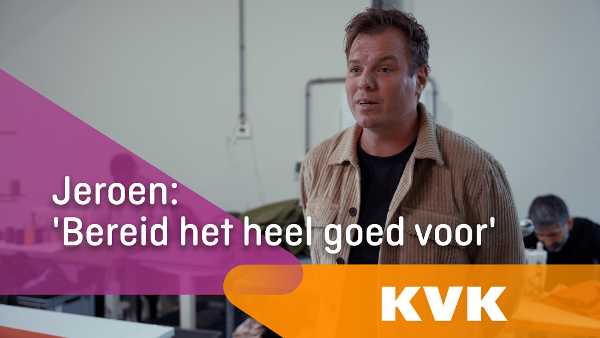Opportunities across the border: how to build a stronger business
- Sandra Visser-Meijer
- Background
- 28 July 2025
- Edited 14 January 2026
- 6 min
- Managing and growing
- International
If your business is doing well, you want to make sure it stays healthy and strong for the future. Sometimes this requires adjusting your business plan. For example, by discovering new opportunities abroad. This allows you to expand your market, reduce costs, or spread risks.
Research (in Dutch) from Statistics Netherlands (CBS) shows that almost 22% of businesses adjust their business plan in response to tension in foreign markets. These businesses choose other countries for their imports or exports, for example. They also look for new suppliers or customers abroad, or relocate their production. In this article, you can read about how to expand your business activities across borders in a smart way.
E-commerce
Buying or selling online is a fast way to find suppliers or customers in new foreign markets. Doing business via e-commerce or international online marketplaces opens unlimited possibilities, is relatively easy, and offers you additional distribution channels. In other words, more ways to sell your products or services abroad.
Do you want to sell via your own online shop? Foreign customers expect you to deliver on time. Then it is useful to have your own stock. Adapt your web shop to the wishes of your foreign customers. And make sure that your products comply with the requirements, laws, and regulations of your new market. Research which other suppliers there are. And whether you can offer the service that your customers expect.
Do you buy your products abroad? The Netherlands has strict rules for product safety. And sometimes there are special requirements for certain product groups. Find out if the product complies with these rules before ordering the products.
International cooperation
By cooperating with foreign companies, you benefit from each other's strengths and share the risks. There are various ways to cooperate. Choose the one that best suits your business. Below are a few possibilities.
Distributor or commercial agent
A distributor or commercial agent sells your product or service on the foreign market. They use their knowledge and network for your business, ensuring you access to a new market. You need almost no extra staff, you can sell quickly, and your financial risk is low.
But you have less control as you depend on the efforts of your partners. And because your partners also want to earn money, your profit margin is lower.
Importer or commission agent
As an importer or commission agent, you sell products or services from foreign suppliers in the Netherlands. Importers buy products abroad. They use these themselves or sell them in the Netherlands. Do you import products from outside the EU? Then you may have to pay import duties. And if these products cause any problems, you are liable for any damage.
Commission agents only establish contacts between Dutch clients and foreign suppliers. They receive a fee for this, a commission. Foreign suppliers then deliver their products directly to their Dutch customers. As a commercial agent, you do not purchase the products yourself and you do not pay import duties. You also do not keep any stock and you are not liable for the products.
Record the agreements made in a contract. This is not mandatory, but it is smart. For example, draw up a distribution agreement or agency agreement together.
Joint venture
A joint venture is an agreement between existing businesses or organisations to work together. This can be national or international. All parties agree on a goal in advance. For example, a temporary project for the construction of a railway tunnel. Or the sale of products in a new foreign market. Read more about joint .
Franchise
You can give or take a franchise. A franchisee enters into a contract with the owner of an existing idea. This is the franchise formula. The owner of this formula is the franchisor. Both can be Dutch or foreign companies. Franchising often ensures rapid growth with little investment. You use the brand awareness of the franchise formula. You also receive support in running your business. In return, the franchisee pays a fee. The franchisor gets a share of the turnover.
Pay attention to quality control. This is especially important if foreign companies use your formula abroad. The formula is linked to your company name. If foreign companies do not apply the formula properly, it can have a negative impact on your brand awareness.
Licence
With a licence you give or receive permission to use a technique or product that is protected by intellectual property. The creator remains the owner. For example, a foreign company may use a technique you have developed. You remain the owner of this technique. In exchange for permission, you receive a royalty, or a fee. Make sure you have a professional licence agreement with agreements about the collaboration.
A licence allows you to sell more quickly in new foreign markets. But you have less direct contact with the foreign market. Are you buying a protected product from a foreign company? What if that product turns out to be unsellable in the Netherlands? Then the risk is yours. So, conduct market research before purchasing a licence or product. This will help you determine whether your plan is feasible.
Do it yourself
Do you want full control of the process? And not depend on partners? Then arrange everything yourself. You do not have to share the profits. You send products and invoices directly to your foreign customer. And you do your own marketing. This works well if you sell high-quality technical products or services. This usually needs a custom approach.
Doing everything yourself carries a greater financial risk. It often requires an investment in time and personnel. For example, you may need to hire regional managers who build and maintain contacts with foreign customers from the Netherlands. Or you may need to open a national sales office in the export country.
Opening a branch abroad
Do you want to open a branch or office abroad? You will usually need additional funds. It is likely that there are different laws and regulations in that country. Doing business with a company in their own country, will make customers more likely to trust you. In that country, you can hire local staff who are familiar with the market. The Netherlands Enterprise Agency, RVO has more information about starting a business abroad (in Dutch).
Manufacturing abroad
If costs are too high or if there is a shortage of personnel in the Netherlands, you can have products or parts manufactured abroad. This is known as Business Process Outsourcing (BPO), or outsourcing.
Starting your own factory requires a high investment. Collaborating with a manufacturing company abroad can results in lower production costs. And you can deliver faster within the region at lower transport costs.
Shortages and delivery problems can be the result of a turbulent global market. Make sure you are not too dependent on one partner. Spread your risks. Work with multiple suppliers or partners in different countries. Near or far.
Nearshoring
Are you opting for a nearby country, such as Poland? This is called nearshoring. Because the country is nearby, the language, and cultural differences are usually smaller. This makes it easier to work together. You are in the same time zone, so you can resolve any problems more quickly. The cost savings are usually less than with offshoring. Salaries are higher in western European countries than in eastern European countries. So choose your country carefully.
Offshoring
Do you choose a country further away, such as India? This is called offshoring. Countries such as India and the Philippines have a large pool of highly educated personnel, such as IT professionals. And operational and personnel costs are often lower than in countries closer to home.
Other costs are often higher with offshoring, such as international transport. Cultural differences are usually greater and communication can be more difficult. Also take into account the different time zones. It is not always possible to solve problems quickly.
Call the KVK Advice Team
Would you like to know whether your plan has a chance of success? Do you want to be sure that expanding across the border is right for your business? Then call the KVK Advice Team at 088 585 22 22.
Making your choice
There is no right or wrong choice. Choose the option that best suits your business. That depends on, for example:
- The size of your business.
- The type of product or service you sell.
- The countries you are interested in.
Ask yourself the following questions:
- Do you want to maintain a lot of control over the process? Or do you prefer to work with foreign partners?
- How much do you know about the country you want to do business with? Very little? Then working with national partners is a better option.
- Do you need extra money for your plans? And is this financing feasible?
- How accessible is the country geographically? Is it easy or difficult to reach?
Combine the various options as cleverly as possible. Take into account an increase in your costs at the beginning. Before you start making money, you will usually incur more costs first.


